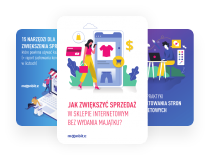Content created by artificial intelligence: is it the future of content marketing?
There are tons of useful tools for marketers that help in performing daily tasks. Topics and titles generating, grammar checking, posts planning: all these functionalities are executed by specific algorithms that are able to "learn" by processing large amounts of data.
Natural language generation
Artificial intelligence is often used in marketing not only for analyzing data or developing strategies but also to support the creation of multimedia content. To 'write' content, artificial intelligence algorithms use Natural Language Generation (NLG) technology, which involves processing structured data into a language used by humans. AI "learns" through thousands of fragments of sample text, thanks to which it is able to recreate the way people communicate with each other.
The results of the artificial intelligence algorithms “creativeness” are often comical and senseless. An example of this is the book "Harry Potter and the Portrait of what Looked Like a Large Pile of Ash" created in 2018 by a bot from Botnik Studio. Although sentences do not contain grammatical or spelling mistakes, they are not logical and contain words that are in no way related to each other.
However, technology is constantly evolving. The GPT-2 algorithm, which aims to predict the next word, is able to create fragments of text that continue one thread in all sentences in comparison to older technologies. The algorithm adapts to the style and vocabulary of the sample text so that the generated text sounds very alike.
Artificial intelligence and content marketing
Text content plays a significant role in marketing. From advertising slogans to multi-page e-books, all text require a lot of time and commitment. And it may seem that "delegating" such tasks of artificial intelligence is a good solution that will allow marketers to focus on creating strategies and planning. However, the content created by AI is not always close enough in its naturalness to that written by humans.
The blog called "This Marketing Blog Does Not Exist" "run" by the intelligent bot of the marketing agency Frac.tl has over 1,100 articles. Although the text is "written" correctly, some passages are difficult to read and understand. This is because the machine, unlike humans, has no contextual knowledge or common reasoning. The phrase "sky color", for example, is synonymous with the word "blue" for a person, but for a machine, it may not say anything at all. If the algorithm had not "learned" the concept of colors and "sky", then it doesn't even know that "sky" can have a parameter that explains its color. Because of this, texts written by artificial intelligence can sometimes seem too rigid, devoid of artistic descriptions and emotions.
Another example is the automatic content generator AI Writer, which offers writing based on the given title. The algorithm creates content full of keywords, which is why they are an excellent "reading" for search engine crawling robots, but not for the ordinary user. The text contain a lot of repetitive words and sporadic language errors, which shows that technology is not yet ready to replace the real human.
Artificial intelligence and human
To test the ability of artificial intelligence to use natural language, there is the Turing test, which is based on a judge (human) having a conversation with two partners (machine and human). The judge decides which answers were given by the algorithm and which by the real person. Author Alan Turing believed that artificial intelligence would eventually be able to pass his test. In 2011 CleverBot was able to deceive 59.3% of interviewers who after the conversation stated that he was a person. On the Bot or not website, users can conduct a Turing test for poetry by themselves, where they choose who the author of the selected poetry is: human or machine.
Artificial intelligence algorithms can be a useful tool in the work of any marketer, but when it comes to aspects related to creative activities, machines are not able to compete with people. At least for now.


